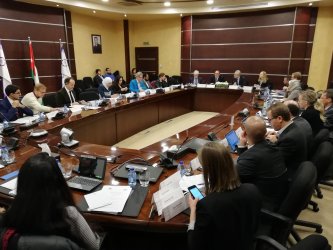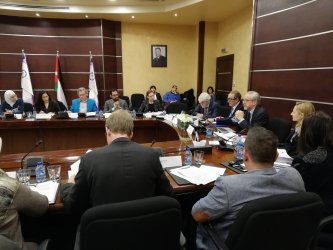-
Sustaining Peace in the WANA Region
Sustaining Peace in the WANA Region
In partnership with the West Asia-North Africa (WANA) Institute, the Dag Hammarskjöld Foundation hosted an interactive workshop on Sustaining Peace in the WANA Region on 6 and 7 February in Amman. Academic experts, UN staff, civil society actors, and government representatives participated in the discussions.
The workshop highlighted international and local initiatives that advance the UN’s Sustaining Peace agenda, and identified which efforts are needed to address obstacles to peace in the WANA region.
The workshop was opened by HE Dr Omar Rifai, Director-General of the WANA Institute – a non-profit policy think tank based in Amman conducting research on human security, economic growth, civil society, and sustainable development.
HE Dr Rifai questioned the concept of peace: “Do we truly understand what the concept of peace means to us in this region? Some people see it as economic prosperity, some as security, some as justice. This makes the sustainability of peace much more difficult, because we are not on the same page.”
“The adoption of the Sustaining Peace Resolutions in 2016 was as a remarkable achievement and milestone in the UN’s work on peacebuilding, in acknowledging how important it is for the international community to work together coherently in support of national governments and local communities to prevent the outbreak or escalation of violence, to address root causes of conflict, and to sustain peace,” said Henrik Hammargren of the Dag Hammarskjöld Foundation, a Swedish NGO that organises thematic seminars, workshops, and consultations on the UN’s efforts on Peacebuilding and Sustaining Peace.
“However, to determine whether these resolutions are really making a difference, we need to look at what changes are being made at the regional, country, and community levels. That is where we should see the impact,” he added.
Youth, Peace, and Security
Participants discussed the role UN entities can play in local peace and development processes, including through implementing the UN Security Council Resolution 2250 on Youth, Peace, and Security and the recommendations from the Independent Progress Study on Youth, Peace, and Security that was requested by Resolution 2250 and published in Spring 2018.
“The WANA Institute acknowledges the imperative peace-building role young people have to play and is proud to be a founding member of the UNSCR 2250 National Coalition in Jordan,” Barik Mhadeen, Human Security researcher at the WANA Institute, said.
Under the umbrella of the Ministry of Youth, the Coalition is working on operationalising UNSCR 2250 in the country and is hoping to mainstream the Youth, Peace, and Security agenda into the upcoming national youth strategy.
“Advancing the Youth, Peace, and Security agenda is part and parcel of not only implementing the twin Sustaining Peace resolutions, but also of advancing the broader 2030 Agenda and capitalising on Jordan’s development gains,” Mhadeen concluded.
From Discourse to Implementation
In April 2016, the UN General Assembly and the Security Council adopted the Sustaining Peace resolutions. The resolutions define sustaining peace as a series of activities to prevent the outbreak, escalation, continuation, and recurrence of conflict, to address root causes, assist parties to end hostilities, ensure national reconciliation, and move towards recovery, reconstruction, and development.
In April 2018, two new resolutions were passed by the Security Council and by the General Assembly confirming support for the Sustaining Peace Resolutions and inviting efforts to further advance, explore, and consider their implementation.
To support this process, it is time to look at how the political discourse is being translated in practical steps at regional and country levels through innovations in preventing violent conflict and sustaining peace.


